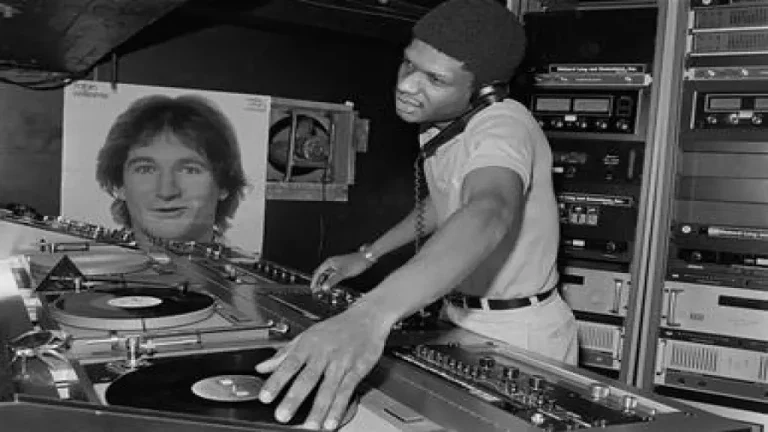To discuss the origins of house and dance music is to acknowledge the immense, foundational impact of the LGBTQ+ community. The entire lineage of this music is inextricably linked to the dancefloors of clubs that offered essential safe spaces and laboratories for musical innovation.
The genre we know as Garage House (or simply “Garage”) is named directly after the legendary New York City club, Paradise Garage (1977–1987). Its spiritual architect and resident DJ was the incomparable Larry Levan.
Levan, an openly gay, Black American DJ, was simultaneously developing a distinct, soulful sound in New York while his friend Frankie Knuckles was establishing ‘House’ in Chicago. Levan’s marathon “Saturday Mass” sets at the Garage were famously eclectic, blending soulful disco, gospel-infused vocals, early electronic elements, and deeply propulsive rhythms.
It was this signature “Garage Sound”—richer, more gospel-tinged, and deeply focused on the emotional power of the vocal—that inspired a generation of New York producers. The club was more than a venue; it was a sanctuary and a vital cultural home for its predominantly Black and Latino gay and queer clientele. This sense of community and the freedom it afforded fuelled Levan’s radical creativity and, ultimately, gave birth to the genre, proving that the LGBTQ+ dancefloor is truly where the heart and soul of modern dance music reside.
The Pioneer of the Garage Genre
Larry Levan (born Lawrence Philpot, 1954–1992) is not just a DJ; he is widely regarded as one of the most important and visionary figures in the history of dance music. As the decade-long resident of New York City’s legendary Paradise Garage, he crafted a unique, deeply soulful sound that directly gave birth to the Garage House genre, named after the club itself.
The Sanctuary and The Sound
The Paradise Garage was a transformative space, predominantly catering to Black and Latino gay and queer audiences who were foundational to the club’s energy and freedom. It was a true sanctuary, especially during the AIDS crisis. Levan’s marathon sets, often dubbed “Saturday Mass,” were spiritual journeys spanning genres from disco and funk to early electronic sounds, dub, and even New Wave. His mixing was less about mechanical beat-matching and more about emotional storytelling, using the club’s custom-designed, state-of-the-art Richard Long sound system like an instrument.
Studio Influence and Legacy
Levan’s impact extended far beyond the DJ booth. As a producer and remixer, he was a key figure in the evolution from disco to house. He took the concept of the remix and turned it into an art form, creating long, drawn-out, and heavily emotional dub versions that were perfectly tailored for his dancefloor.
Notable tracks he produced or remixed include:
- The Peech Boys – “Don’t Make Me Wait” (1982): Widely considered a pioneering track for its use of electronic elements and dub effects, and a template for the emerging New York house sound.
- Taana Gardner – “Heartbeat” (1981) and “When You Touch Me” (1982)
- Gwen Guthrie – “Ain’t Nothin’ Goin’ On But The Rent” (1986)
His fusion of soulful, gospel-infused vocals with futuristic drum machine rhythms and heavy dub effects became the defining signature of Garage House and a core pillar of modern dance music, inspiring countless DJs and producers from New York to the UK. Levan’s legacy is the powerful and lasting proof that the LGBTQ+ dancefloor is the true birthplace of dance music culture.



